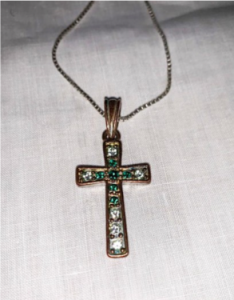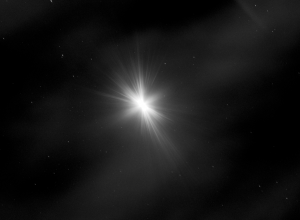The title of the poem is taken from the title of a piece that the sitter, Suzanne, wrote just before or during chemotherapy. Her Per Ardua ad Astra was published by University College Hospital Cancer Fund as part of the collection Words From Around The Table. Suzanne talked of a life-long interest in the stars – scientific and spiritual. The title of the poem, Per Ardua ad Astra, metaphorically echoes her cancer journey, which she embraces both as a scientist keeping up to date with the latest research, and as a Christian working through faith and prayer.
An extract from this piece is italicised and in ‘single quotation marks’ to indicate that it is published, unlike her father’s memoir – The Spirit of Adventure – also referenced in the poem, which is italicised but without quotation marks as it is unpublished. Throughout there is an intricate layering of citation, beginning with the opening verbatim.
Suzanne weaves a view of herself as a ‘fractal person’ in relation to her mother, father, sister and other people. She speaks of herself through accounts of and references to family members, living and dead. She also seems to adopt their positions – and the writer’s – in an almost cinematic register and feed them into her own. At times, the conversation paused and Susanne moved to topics which appeared new or divergent, following an inner logic. At other times (‘Beneath the pacific surface’), the patterning appeared as a never-ending fractal that repeats itself at different scales of self-similarity. Natural fractals include the branching patterns of trees, river networks, blood vessels and the spiral patterns of seashells and galaxies. In computer fractals like the Mandelbrot set we can zoom in forever. Suzanne puts the writer ‘in the picture’ while Malcolm puts himself in the picture by relating one image to another on his phone (see In the Picture).
This is the only poem which refers to the event of writing itself, addressing self, sitter and reader(s) equally – a meta-dramatic impulse that came out of the collapsing of past (the noted/remembered conversation), ‘the other’ (sitter), the present (the act of writing in the park) and the ‘I’ (the writer). It was, Di felt, the only way to truly express the nature of the exchange. In giving back the poem it became evident that approval had to be obtained from Suzanne’s others too. Her sister exercised significant editing rights, censoring certain family references she found intrusive. Debate continued between the two sisters until, after a couple of drafts, a satisfactory conclusion was reached (see Magic Words).
“I’m a Christian,”
she says with a smile
that suggests more
than meets the eye.
The dark amethyst of the jacket
has something of the bishop’s purple
but she doesn’t look like a Minister –
though she could have been once.
But she does preach
six times a year
at a community church in Fitzrovia.
Then I notice the cross –
unusual.
A gift from Ethiopian friends
she thinks.

Beneath the pacific surface
a confluence of blood –
British, Danish, French.
Her father, an Englishman,
meets her mother in a cafe,
recounts events
in his signature rhyming couplets:
I saw sitting on a chair
a Viking maiden blonde and fair..
..Betty was the maiden’s name
and so into my life she came.
The lines, part of a longer ode,
are penned neatly but freely
on stationery of the time,
though, she says wryly,
the back of an envelope would do.
When war comes
he shaves a few years off his age
to get into the RAF.
Years later
when she takes him back
to the Canada of his youth
to celebrate his 85th
he’s turning 88.
George
is an incorrigible free spirit,
writes:
I like to have the feeling,
I can go where, when and how I like.
But when her mother becomes ill
he must stay put. And so
to stay his Wanderlust
he picks up the pen abandoned
after the War
he never talked about
and writes The Spirit of Adventure –
a song of himself
in metre and rhyme joyous
as Walt Whitman.
From an early age he’s raring to go.
Australia, New Zealand, beckon,
but an assisted passage is not for him.
The money he’s saved in secret
will get him to Canada though.
Leaving his family open-mouthed
he steams out of Waterloo bound for Quebec
to try his luck as a farmer’s hand
in Winnipeg
‘Queen of the Prairies’.
Later
he crosses the border
without a passport
to find English pals in New York,
goes with one to Chicago
where Al Capone’s in town.
Heading back
on the roof of a freight train,
they wind up in jail –
murder suspects
in a case of mistaken identity
worthy of Mark Twain.
It’s a rollicking tale
of a young man’s quest for adventure
in the America of the late 1920s,
a lust for life that sees him
up and down the West Coast –
from Charleston to Los Angeles,
Frisco to Seattle,
passing through the Panama Canal
eight times
as ship’s fireman.
He’s caught in a hurricane
in the Caribbean
and the dry land equivalent –
The Wall Street Crash.
But the youthful gaze
sees not risk, only adventure,
inspired by a mother who had
circled the globe a few times
and to whom travelling was almost life itself.
With a wry smile she observes
his mother, a Frenchwoman,
was a companion most like –
not an adventurer like him.
He dies at the age of ninety-nine –
“one year short of a helicopter ride.”
She reflects for a moment.
“Sometimes people say the expression
on my face is my mother” –
a woman who considered herself
absent too long from her Danish homeland
to collect the pension due.
“There was a lot of sorrow in my mother.”
As she talks
the glasses poised between finger and thumb
turn this way and that, a pendulum
of motion and emotion.
A writer herself
her voice is silent
till following the father’s cue,
she begins her own journey into the labyrinth.
It’s life and death
but not as he knew it.
She comes back from the hairdresser
to find not the thin envelope
she usually got after a mammogram
but a fat one.
It was a swift call to arms –
surgery, chemo, radiotherapy,
over ten months.
“The day of the biopsy was for me
one of the darkest hours of this journey –
I wished my mother was alive.”
Still in shock
she begins treatment,
choosing Charing Cross over UCH
because she had a good nurse.
From her hospital room
the sister who took care of her
looked out at her old school.
As she begins chemotherapy
she has a dream –
she’s standing before a dark tunnel
she knows she must enter.
It speaks with Jungian prescience.
Her mind goes back to Ghana,
her VSO years
teaching physics and chemistry
where “the thorns were sharp and the roses beautiful.”
She gets malaria and hepatitis,
ravaged by sickness
walks between worlds.
But at the end of the night
the Morning Star
always brought
the return of the Light.
‘Stars…
all dying, changing matter
into energy…
take me to a place
where the stars will shine…
And let the morning star shine
in my present darkness,
telling me dawn will rise.’
Since the biopsy
she has not cried.
Nine months later
on the radiotherapy table
the unshed tears break free.
‘So let the tears cascade down
like torrential rain.
One day all my tears
will be wiped away.’
The conversation winds,
pools, surges forwards,
backwards,
each piece of the story
diving into itself
fractal-like,
patterns emerging
like rock pools that vanish
at the turn of the tide.
Before the cancer
she did a lot of etching –
donned the white gloves
in the British Museum
to leaf through Da Vinci and Rembrandt
then sit behind perspex
translating the Masters
to her own page.
She still sketches, admits
to once having a drawing on show
in Tate Modern’s Community Room.
I mention Van Gogh.
The eyes smile.
“My grandmother’s name may be Flemish.”
At home she has a Danish flag,
cooks a traditional beef dish with prunes
and celebrates Christmas on Christmas Eve.
She wears a ring of Danish silver.
“It’s very much to do with my heart,”
Then adds with a grin,
“But if England were playing Denmark at football
I’d support England.”
The conversation takes an unexpected turn
and I’m doing the talking,
recalling my journey through
my mother’s dementia and the cancers
that took my father and brother.
The pastoral gaze is clear, penetrant,
the eyes infinitely kind.
I begin this poem in Regent’s Park.
A butterfly lands bright on the page
and for a moment the sun breaks through.
The obscuring wind blows
and it’s away.
And it occurs to me
our conversation was like this –
a meditation
in and out of darkness and light,
feet planted firmly as they can be,
eyes to the stars.
